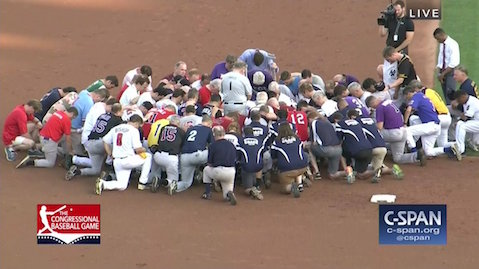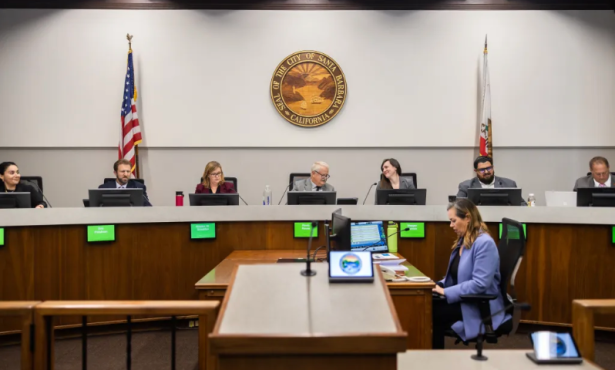News Commentary: Is That a Silencer in Your Pocket?
Or Are You Just Glad to See Me? Reflecting on Baseball, Congress, and Rage-a-holics with Guns

Some things look worse than they actually are; others are worse than they look. The deceptively euphonious SHARE Act — an acronym that stands for Sportsmen’s Heritage and Recreational Enhancement — now looming before the Natural Resources Committee in Congress is so bad that it qualifies as both.
What most immediately poked me in the eye is a provision in the bill that would eliminate all restrictions on the sale of sound suppressors — better known as “silencers” in bad spy and gangster movies — for handguns and rifles.
Silencers? Are you kidding?
Evidently not.
Ever since 1934, the federal government has imposed strict restrictions on the sale of Tommy guns and silencers, allegedly inspired by the machine-gun slaying of seven Chicago mobsters on St. Valentine’s Day in 1929, hence the unforgettable sobriquet “the St. Valentine’s Day Massacre.” Silencer sales are allowed in 39 states and banned outright in others, most notably California and New York. But the federally mandated background checks for silencer sales in states where it’s legal are said to be onerous and time consuming, frequently taking 10-12 months from start to finish. In addition, the feds require a payment of $200, said by gun advocates to be extortionately unreasonable. Hunters, we are told, need silencers because the loud report of the first shot fired could alert nearby game that they could be next. In addition, the undeniably loud noise made by the shooting of guns clearly has a deleterious effect on the long-term hearing of sports shooters and gun enthusiasts. Hence Congressmember Jeff Duncan, a South Carolina Republican who boasts the most conservative voting record in all of Congress, has introduced something called the Hearing Protection Act, which he has folded into the aforementioned SHARE Act, which — coincidentally — he also has coauthored.
Having just sat through a criminal hearing in which I was bombarded with gruesome forensic photographs that displayed the bloody handiwork of a .22 caliber semi-automatic equipped with a silencer — three dead bodies with a total of 14 bullets in their skulls — I may well be a little emotionally hair-trigger on the subject of silencers, which, for the record, do not actually “silence” the sound of gunshots as much as they muffle them. These images were blown up on the courtroom wall bigger than life — though not death — during the preliminary hearing of Pierre Haobsh, who stands accused of killing noted Chinese herbalist Dr. Henry Han, his wife Jennie Yu, and their 5-year-old daughter, Emily Han, last year. Eight bullets alone had been pumped into Emily’s head. The forensic pathologist explained in vivid detail how the silencer deployed by the killer — and pressed up against Emily’s skull — funneled the rush of combustible gases released by the controlled explosion of the gun’s firing under Emily’s skin and into her skull’s bone tissue and back out again. This caused the skin to bubble, buckle, and rip, the pathologist clinically explained. It left, as near as I could less-than-clinically tell, a really big hole.
In movies, only assassins and hit men use silencers. In the Han killings, the silencer was clearly used to help the killer get away with murder. Prosecutors have video of Haobsh — who has pled not guilty and has yet to be convicted of anything — buying two handguns in a Tempe, Arizona, gun shop a few days before the shooting. In Arizona, silencer sales are legal, but a dealer needs a special license. Haobsh’s gun dealer did not have one. Haobsh made a point of asking for guns that come equipped with special threads, which protrude nipple-like from the barrel of the gun — onto which a silencer could be screwed. The evidence suggests that Haobsh made his own silencer.
I asked friends of mine who shoot about the noise made by guns. It’s definitely an issue. They wear earplugs. Some use the kind you get in hotel rooms. Others get fancier form-fitted plugs. And then, of course, there are the giant earmuffs seen on any shooting range in America that resemble big 1970s vintage headphones.
One would think that in the case of a mass shooting, the presence of a silencer would make it that much harder for intended victims to realize they’re under attack. Or where the attack was coming from. One would also suppose that such delays would serve only to expand the ultimate body count. One might suppose the outcome of this equation — weighing the inconvenience of wearing earplugs against the inconvenience of being dead forever — would be obvious. But according to studies cited by the American Suppressor Association — yes, they do have associations for everything — and the National Rifle Association, my reckoning doesn’t really add up. That’s because suppressors are almost never implicated in acts of criminal violence. And gun control advocates don’t dispute this. They argue this fact serves only to illustrate just how well the existing restrictions are working.
Somehow in all this, the photographs of the three dead Hans keep coming to mind. I am reminded of Josef Stalin’s sublimely cynical quote: “One death is a tragedy,” Stalin noted. “One million is a statistic.”
As usual there’s no shortage of grim ironies surrounding this legislation, which was supposed to have had its first committee hearing this past week. From the outset, the timing was awkward, coming roughly on the first-year anniversary of the largest mass shooting in American history at a gay nightclub in Orlando Florida — Pulse — that left 49 victims and 58 seriously wounded.
The timing, it turned out, would only get worse.
The same day the hearing was scheduled, a rage-addled Bernie Sanders supporter from Illinois lit up a baseball field in Arlington, Virginia, shooting rapid fire at members of the Republican congressional baseball team, who were practicing for the big game the following night against their Democratic rivals. By the time 66-year-old James T. Hodgkinson was done spraying the field, four people had been seriously wounded, including House Majority Whip Steve Scalise. When the smoke had cleared, the only corpse on the ground would be Hodgkinson’s. Walking off the field just as Hodgkinson showed up was none other than South Carolina’s Jeff Duncan, author of the Hearing Protection Act. As Duncan and Hodgkinson passed each other, Hodgkinson asked Duncan,” Excuse me, sir, who’s practicing today? Democrats or Republicans?” As Duncan recounted, “I said, ‘This is a Republican team,’ and he said, ‘K, thanks.’”
In response to the baseball field shooting, Republicans opted to reschedule hearings on the SHARE Act and the proposed new law on silencer sales. To the extent last week’s experience might have given Duncan pause, he’s not letting on. The gunman, he noted, did not use a silencer. Illinois, Duncan added, has some of the toughest gun control laws in the nation, yet they failed to stop Hodgkinson. And had Hodgkinson being using a suppressor and survived the ensuing shoot-out, he would have been looking at 30 years behind bars.
Should the Hearing Protection Act be approved, it would supersede California’s ban and those of any states in which silencers are flat-out illegal. In that eventuality, silencer sales would be subject to the same back-ground check screening required for all gun purchases. No more, no less. It turns out there are roughly 1.2 million legally registered silencer owners in the United States. Who knew? Sales have jumped dramatically in the past two years. Gun control advocates speculate that as gun sales flattened, the guns-and-ammo industry scrambled to make up the difference in the sale of morbidly sexy accessories. Should Duncan’s bill pass, all existing registration records of who owns silencers will be destroyed.
All that’s bad enough.
But according to my sources, other provisions of the SHARE Act are much worse. They just don’t have the quasi-death-porn patina associated with silencers.
Of particular note is a provision that will allow the importation and sale of armor-piercing bullets, long opposed by law enforcement.
Even more dramatic is a provision that will drastically open up the interstate transport of firearms and ammo. If passed, law enforcement officers could be held personally liable to civil penalties if they seek to interfere with the interstate transport of guns and ammo by enforcing state or local gun control laws.
Under existing law, it’s all but impossible to sue law enforcement officers for doing anything in the line of duty — no matter how heinous the results. If passed, the provision would pierce a veil of protection that’s centuries old. It is radical in the extreme.
Secretary of the Interior Ryan Zinke has yet to weigh in on these measures, though one of his first actions upon assuming the throne was to revoke lead ammo bans on federal lands. Lead ammo poisoning is a major trickle-down danger for scavengers — most notably the federally endangered condor — that feast on the discarded remains and carcasses left by hunters.
Likewise, Donald Trump has been silent on the matter, though his son — Donald Trump Jr. — was filmed in an especially chummy interview with Joshua Waldron, CEO of SilencerCo out of Utah. “I believe in American manufacturing,” says Trump Jr., “and I love the product.” Waldron is currently offering to pay up to $130 in legal fees for those seeking to buy his product and to rebate the $200 the feds charge. Silencers are known colloquially as “cans,” and Waldron’s company also offers instruction at something dubbed “Can U” in how to use a suppressor.
And for those wondering what to get their dad for Father’s Day, Waldron is offering a 30 percent discount on his suppressors. Nothing says “thanks Dad” like a brand new silencer.



